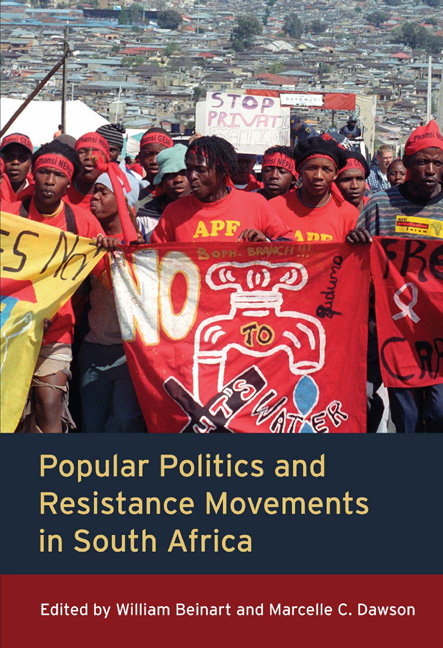Book contents
- Frontmatter
- Contents
- Contributors
- List of Abbreviations and Acronyms
- 1 Popular politics and resistance movements in South Africa, 1970–2008
- 2 The Durban strikes of 1973: Political identities and the management of protest
- 3 ‘There's more to it than slurp and burp’: The Fatti's & Moni's strike and the use of boycotts in mass resistance in Cape Town
- 4 The role of the African National Congress in popular protest during the township uprisings, 1984–1989
- 5 Strategies of struggle: The Nelson Mandela campaign
- 6 From removals to reform: Land struggles in Weenen in KwaZulu-Natal, South Africa
- 7 From popular resistance to populist politics in the Transkei
- 8 ‘It's a beautiful struggle’: Siyayinqoba/Beat it! and the HIV/AIDS treatment struggle on South African television
- 9 The Nelson Mandela Museum and the tyranny of political symbols
- 10 Black nurses’ strikes at Baragwanath Hospital, Soweto, 1948–2007
- 11 The ‘New Struggle’: Resources, networks and the formation of the Treatment Action Campaign (TAC) 1994–1998
- 12 New social movements as civil society: The case of past and present Soweto
- 13 ‘Phansi Privatisation! Phansi!’: The Anti-Privatisation Forum and ideology in social movements
- Endnotes
- Bibliography
- Index
2 - The Durban strikes of 1973: Political identities and the management of protest
Published online by Cambridge University Press: 21 April 2018
- Frontmatter
- Contents
- Contributors
- List of Abbreviations and Acronyms
- 1 Popular politics and resistance movements in South Africa, 1970–2008
- 2 The Durban strikes of 1973: Political identities and the management of protest
- 3 ‘There's more to it than slurp and burp’: The Fatti's & Moni's strike and the use of boycotts in mass resistance in Cape Town
- 4 The role of the African National Congress in popular protest during the township uprisings, 1984–1989
- 5 Strategies of struggle: The Nelson Mandela campaign
- 6 From removals to reform: Land struggles in Weenen in KwaZulu-Natal, South Africa
- 7 From popular resistance to populist politics in the Transkei
- 8 ‘It's a beautiful struggle’: Siyayinqoba/Beat it! and the HIV/AIDS treatment struggle on South African television
- 9 The Nelson Mandela Museum and the tyranny of political symbols
- 10 Black nurses’ strikes at Baragwanath Hospital, Soweto, 1948–2007
- 11 The ‘New Struggle’: Resources, networks and the formation of the Treatment Action Campaign (TAC) 1994–1998
- 12 New social movements as civil society: The case of past and present Soweto
- 13 ‘Phansi Privatisation! Phansi!’: The Anti-Privatisation Forum and ideology in social movements
- Endnotes
- Bibliography
- Index
Summary
Introduction and context
Labour mobilisation, work stoppages and strikes have often been central elements in popular protest in South Africa, both before and after 1994. This chapter is the first of three that focus on workers and protest; it examines the Durban strikes of 1973 – a series of labour actions that preceded the rise of independent trade unions in the course of the 1970s. These strikes provide an important window through which to examine not only labour activism, but also the roles played by the state and company managers in the containment of protest; beyond this, they also provide an insight into the complexities of the relationship between protest and violence in this period. In this chapter I argue that – somewhat surprisingly – the state and employers did not automatically use violence to repress the strikes in Durban; in turn, workers were not provoked into retaliation. This suggests that – in analysing continuities and changes in the potential for popular mobilisation and protest in the apartheid era – it is necessary to consider the rare moments in which the state hesitated to close down political space. This theme is pursued further in the next chapter.
Between 9 January and 31 March 1973 approximately 61,410 black workers in Durban embarked on strikes in their various industries and companies. This made the Durban strikes the largest labour protest since the 1948 election win of the National Party. Indeed, more black workers were on strike in Durban in these months than during the whole of the 1960s: according to figures gathered by the South African Institute of Race Relations, an average of 2,000 black workers had embarked on strikes for each year of that decade. The first two years of the 1970s had seen an increase in both the intensity and frequency of strikes: at the end of 1971, for example, 13,000 Ovambo workers had taken part in a work stoppage in South West Africa.
It is notable, however, that these earlier strikes rarely involved more than 2,000 workers at a time; likewise, they were isolated within individual industries and did not threaten either to combine into a general strike or invade the central spaces of the affected cities themselves.
- Type
- Chapter
- Information
- Publisher: Wits University PressPrint publication year: 2010



